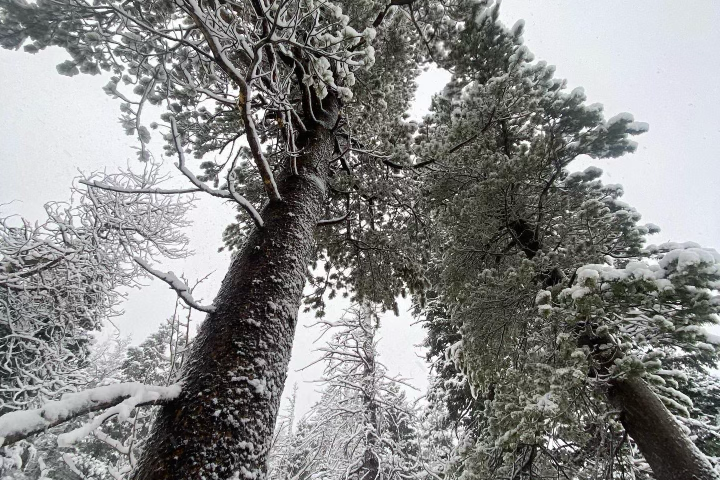Column: The Willow Project is the beginning of the end
Photo credit: Eliza Tiles
Snow heavily covers trees in Mammoth Lakes, CA. This winter season has seen an increase in harrowing snow storms around the globe as climate change increases the intensity of weather events. The Willow Project will add to climate change and thus weather patterns are only going to get worse.
March 22, 2023
This past summer, President Biden signed the country’s largest climate-focused legislation into law: The Inflation Reduction Act. According to the IRS, the act aims to “curb inflation by reducing the deficit, lowering prescription drug prices and investing into domestic energy production while promoting clean energy.” With $369 billion in funding to battle climate change, the inflation reduction act will help Biden come closer to achieving his goal of cutting climate pollution in half from 2005 levels by 2030.
Biden ran on a climate-forward campaign in hopes of collecting young votes — something I, for one, was happy about. He even went as far as promising to end drilling on federal lands. Yet, in the wake of crucial climate action, recent disputes over the intended Willow Project in Alaska proposed by ConocoPhillips have threatened any and all national progress in the climate sphere.
The Willow Project is the largest oil extraction project proposed on federal lands with a $6 billion proposal to drill oil and gas in Alaska. According to Reuters “It would be located inside the National Petroleum Reserve-Alaska an … area on the state’s North Slope that is the largest tract of undisturbed public land in the United States.” Researchers from Protect Our Winters report that over the next 30 years, emissions from the Willow Project is equivalent to that of “66 coal-fired power plants (roughly one-third of all U.S. coal plants) or from 56 million vehicles over an entire year.”
Approving the Willow Project is not the answer, and Biden must choose to invest in a climate-resilient infrastructure before there’s no turning back.
The proposed location of the Willow Project neighbors the Alaskan native village of Nuiqsut and presents a clear threat to the health and livelihood of its residents. Just last year, villagers had to evacuate due to a gas leak caused by ConocoPhillips. The Guardian highlights this, explaining that “the Willow Project would] mark the end of a way of life for communities in the rapidly warming Arctic.”
Yet proponents of the drilling site, specifically Alaska’s lawmakers, say it will “create jobs and boost domestic energy production [and be] a much-needed new source of revenue for the region” (CNN). Lawmakers hope it will help provide consistent basic services to those who inhabit the remote villages of the North Slope.
Not only will the Willow Project affect Alaska’s environment and vulnerable species, but it will also have detrimental effects on climate change. From impacting the ocean’s thermohaline circulation to abrupt changes in weather, the more greenhouse gasses we emit, the worse the effects of climate change will be.
In light of the recent controversy surrounding the project, the Biden administration looked at reducing the number of approved drilling pads from three to two while increasing the funding for nature conservancies in Alaska even going as far as offering to plant trees to offset carbon emissions in hopes of assuaging criticism. According to the Guardian, “The latest review released by the Bureau of Land Management suggests that a scaled-down Willow project would minimize the impact on vulnerable species including polar bears, yellow-billed loons and caribou while remaining in line with the minimum ConocoPhillips has said it needs to drill to make the project profitable.”
As cliche as it is, climate change is real, and if large corporations and governments don’t start taking accountability there will be no future for us on this planet. As an influential nation, the United States has the power to be a role model in the climate sphere and advocate for global change and progress. It’s clear that Biden’s final decision on the approval of the Willow Project will significantly impact his climate credibility. Furthermore, as highlighted by CNN, “the decision to approve Willow could risk alienating a base of young voters…like the resistance to the Keystone XL pipeline during the Obama administration.”
When I began writing this column, I was going to encourage action against the Willow Project and highlight the plentiful resources to help protect the arctic and keep the Biden administration accountable. However, the Biden administration approved the Willow Project on March 13 under pressure from the global energy crisis. Biden had the chance to invest in renewable energy and infrastructure that looks out for the future of this country and the planet, not those that continue to hurt it.
It’s not just the thought of 250 million metric tons more of CO2 into the atmosphere from Willow that upsets me. It’s also the disappointment in democracy. We are told that our voices matter and that every vote counts, but it’s hard to have faith in our government when politicians continue to break promises and reinstate just how much control large corporations have over this country.
In the words of activist and marine biologist Dr. Ayana Elizabeth Johnson, “This fight is not over. See you in Court @POTUS.”









